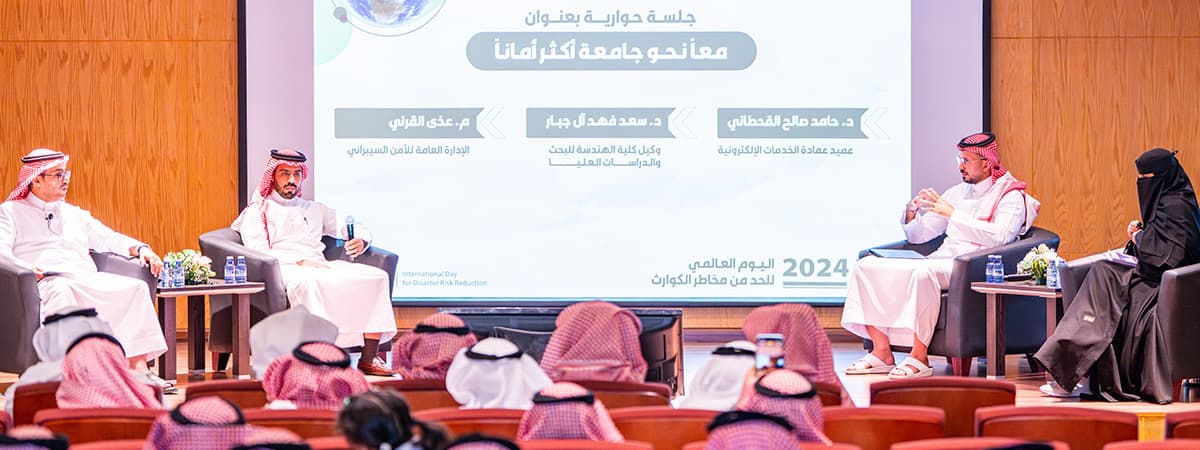On October 13, 2024, Acting President of King Khalid University, Prof. Saad bin Mohammed bin Dajam, attended a program and panel discussion under the theme "The Role of Education in Protecting and Empowering Youth for a Disaster-Free Future." The event, organized by the university's Risk Management and Business Continuity Administration, was held at the Exhibition and Conference Center in the university city of Al-Fara’a in celebration of International Day for Disaster Risk Reduction, which falls on October 13. The event is part of the university's efforts to raise awareness about risks and disasters and explore ways to manage and mitigate their impact before, during, and after they occur.
Dr. Saleh bin Yahya Al-Ghamdi, General Supervisor of Risk Management and Business Continuity at the university, explained that the event provided an opportunity to spread a culture of risk and disaster awareness and enhance the university community's readiness to deal with crises. He noted that the university's risk management efforts aim to ensure business continuity without disruption by developing comprehensive plans and strategies that ensure adaptability to changing conditions and the ability to face health and natural challenges encountered by academic institutions. He also added that collective work and coordination among all university entities are key to achieving these goals, and that the department provides training programs and workshops to raise awareness and strengthen the skills necessary for effective and efficient risk management.
A panel discussion titled "Towards a Safer University Together" was also held, moderated by Dr. Saleh bin Yahya Al-Ghamdi, with participation from Dr. Hamid Saleh Al-Qahtani, Dean of the Deanship of E-Services, Dr. Saad Fahd Al-Jabar, Vice Dean of the College of Engineering for Research and Graduate Studies, and Engineer Atha Al-Qarni from the university's Cybersecurity Department. The panel addressed the challenges universities face in times of crises and explored ways to enhance the continuity of education and scientific research through proactive planning and collaborative efforts.
The panel discussion covered four main topics related to risk management in universities. The first topic focused on the concept of risk and how to address it in educational institutions. Dr. Saad Al-Jabar explained that risks can be financial, academic, technical, or environmental, each of which may affect the achievement of the university's academic and administrative goals. He emphasized the importance of identifying and assessing these risks to develop effective strategies to manage them. Dr. Hamid Al-Qahtani discussed the university's experience during the COVID-19 pandemic, where the strong infrastructure facilitated a swift transition to online education. He pointed out that technology plays a pivotal role in enhancing the continuity of education and minimizing risks. Engineer Atha Al-Qarni highlighted cybersecurity risks that threaten universities, stressing the importance of continuous education and training to raise awareness among employees and students about the basics of cybersecurity.
The discussion then shifted to the second topic, which focused on the national role in enhancing risk management. Dr. Hamid Al-Qahtani spoke about the significant digital transformations happening in Saudi Arabia as part of Vision 2030 and the importance of national indicators, such as "SOMOD" and "NADHI," in enhancing business continuity and ensuring safety in higher education institutions. Engineer Atha Al-Qarni noted that cybersecurity is a core component of the national strategy to protect digital assets in universities, highlighting that the university relies on specialized teams to monitor threats and secure systems. Dr. Saad Al-Jabar added that King Khalid University is working on developing effective policies to improve infrastructure and strengthen institutional resilience to environmental risks, ensuring business continuity.
The third topic discussed the current challenges and obstacles facing risk management in universities. Engineer Atha Al-Qarni reviewed the most prominent cybersecurity challenges, such as cyber-attacks, a lack of security awareness, and outdated technology. She proposed solutions to improve defense capabilities and suggested organizing training workshops to raise awareness. Dr. Saad Al-Jabar emphasized that one of the challenges is the limited awareness of the importance of risk management and limited resources, pointing out that coordination between departments is one of the essential factors to ensure effective crisis response.
The panel concluded with the fourth topic, which addressed the importance of building a culture of institutional risk awareness. Dr. Saad Al-Jabar stressed that building this culture requires collaboration from everyone, from top leadership down to all employees and students. He explained that regularly training staff and students on how to respond to emergencies contributes to enhancing the university’s crisis response. Dr. Hamid Al-Qahtani noted that technology can play a pivotal role in promoting a risk management culture by developing electronic platforms and ongoing awareness campaigns, which help create a safe and sustainable educational environment.
At the end of the session, Acting University President Prof. Saad bin Mohammed bin Dajam honored the speakers in recognition of their contributions to raising awareness about the importance of risk management and business continuity. Prof. Bin Dajam called on everyone to actively contribute to this collective effort, affirming that teamwork is the way to build a safe and sustainable educational environment.

